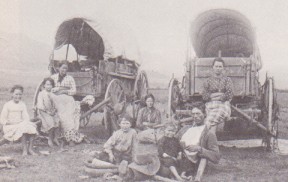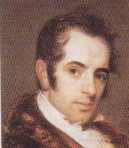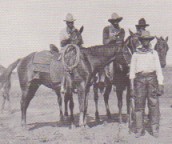|
● Early
Fiction
● Transcendentalists
● Power
of Imagination
● New
Visions of America
● Reform
and Liberation
● Regionalism
● A
New Wave
● Sympathetic
Views
● Rebellious
Spirit
● The
Modernists
● The Lost
Generation
● Harlem Renaissance
● New
Drama
● Depression,
Realism and Escapism
● Postwar Voices
and the "Beat Generation"
● New American
Voices
Text
 From
the beginning of American history to the present day, American literature
has recorded the story of a quest.
At different times the quest has taken different forms. In the 16th
century Europeans came to the New World in search of the
lost continent of Atlantis. They came looking for the golden
"cities of Cibola"
that haunted Coronado's imagination. They searched for the
fabled Northwest Passage to the Orient. From
the beginning of American history to the present day, American literature
has recorded the story of a quest.
At different times the quest has taken different forms. In the 16th
century Europeans came to the New World in search of the
lost continent of Atlantis. They came looking for the golden
"cities of Cibola"
that haunted Coronado's imagination. They searched for the
fabled Northwest Passage to the Orient.
 |
| Covered Wagons |
 These
fantastic dreams changed in time to more down-to-earth dreams of
success. These dreams brought millions of young men and women from
farms and small towns to cities in the hope of winning fame and
fortune. At times the quest was a religious pilgrimage.
For example, the Puritans hoped the New World would become a New
Canaan, where
a chosen people might at last build a society of which god would
approve. The
Mormons who trekked across the plains to Utah were inspired by a
similar vision. Other pioneers (and many later Americans
as well) were pulled westward neither by financial nor by religious
ambitions. They were simply restless. Whether they traveled by covered
wagon or by automobile
trailer, they believed that being on the road was better
than staying
put. The questing of the American people has indeed been
a drama of many parts. In one way or another, however, it has always
been a "pursuit
of happiness". American literature is the continuous narrative
of that pursuit These
fantastic dreams changed in time to more down-to-earth dreams of
success. These dreams brought millions of young men and women from
farms and small towns to cities in the hope of winning fame and
fortune. At times the quest was a religious pilgrimage.
For example, the Puritans hoped the New World would become a New
Canaan, where
a chosen people might at last build a society of which god would
approve. The
Mormons who trekked across the plains to Utah were inspired by a
similar vision. Other pioneers (and many later Americans
as well) were pulled westward neither by financial nor by religious
ambitions. They were simply restless. Whether they traveled by covered
wagon or by automobile
trailer, they believed that being on the road was better
than staying
put. The questing of the American people has indeed been
a drama of many parts. In one way or another, however, it has always
been a "pursuit
of happiness". American literature is the continuous narrative
of that pursuit
Early Fiction
 |
|
Washington
Irving
|
 Writers
of the post-Revolutionary period had been embarrassed that America
did not have much of a history. Washington
Irving (1783-1859) solved this problem by inventing a history.
His History of New York (1809) is supposedly an account of
the Dutch settlement of Manhattan
Island. With this work Irving furnished America with
its first myth—hero,
Father Knickerbocker. In "Rip Van Winkle" and "The
Legend of Sleepy Hollow", Irving contributed even more memorable
characters to his legendary recreation of the American past. In
his accounts of his history of The Alhambra (1832), the fabulous
palace of the Moors in Granada, Spain, Irving also demonstrated
that an
American writer need not write only about America in order to remain
a patriot. Writers
of the post-Revolutionary period had been embarrassed that America
did not have much of a history. Washington
Irving (1783-1859) solved this problem by inventing a history.
His History of New York (1809) is supposedly an account of
the Dutch settlement of Manhattan
Island. With this work Irving furnished America with
its first myth—hero,
Father Knickerbocker. In "Rip Van Winkle" and "The
Legend of Sleepy Hollow", Irving contributed even more memorable
characters to his legendary recreation of the American past. In
his accounts of his history of The Alhambra (1832), the fabulous
palace of the Moors in Granada, Spain, Irving also demonstrated
that an
American writer need not write only about America in order to remain
a patriot.
 |
| Cowboys |
 His
Tour on Prairies (1835) showed Irving's interest in the literary
possibilities of the West. Here, however, he was poaching
on the literary territory of fellow New Yorker James
Fenimo Cooper (1789-1851). Cooper's novel The Spy (1821)
was an exciting story of espionage
in New York during the Revolution, but he did not really hit
his stride as an author until he turned to The Pioneers
(1823). This was the first of the five great romances
known as the Leather—Stocking Tales. Surpassing Irving
as a mythmaker, Cooper introduced in The Pioneers the fabulous
woodsman,
Natty Bumppo. He was the forerunner
of all heroic forest scouts,
bear hunters, and cowboys of later American novels and films. The
Last of the Mohicans (1826), The Prairie (1827), The
Pathfinder (1840), and The Deerslayer (1841) pursued
Natty's career both forward and backward in time, from
the first flush of manhood to his death as an old man on the western
plains. His
Tour on Prairies (1835) showed Irving's interest in the literary
possibilities of the West. Here, however, he was poaching
on the literary territory of fellow New Yorker James
Fenimo Cooper (1789-1851). Cooper's novel The Spy (1821)
was an exciting story of espionage
in New York during the Revolution, but he did not really hit
his stride as an author until he turned to The Pioneers
(1823). This was the first of the five great romances
known as the Leather—Stocking Tales. Surpassing Irving
as a mythmaker, Cooper introduced in The Pioneers the fabulous
woodsman,
Natty Bumppo. He was the forerunner
of all heroic forest scouts,
bear hunters, and cowboys of later American novels and films. The
Last of the Mohicans (1826), The Prairie (1827), The
Pathfinder (1840), and The Deerslayer (1841) pursued
Natty's career both forward and backward in time, from
the first flush of manhood to his death as an old man on the western
plains.
Previous Page Next
Page
|

